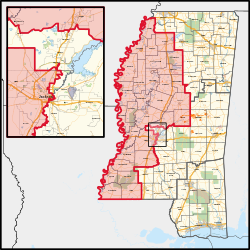A request that this article title be changed to Mississippi's congressional delegations is under discussion . Please do not move this article until the discussion is closed. |

These are tables of congressional delegations from Mississippi to the United States House of Representatives and the United States Senate.
Contents
- United States Senate
- U.S. House of Representatives
- Current members
- Mississippi Territory
- State of Mississippi
- Key
- See also
- References
The current dean of the Mississippi delegation is Representative Bennie Thompson (MS-2), having served in the House since 1993.









